In Car Audio System Market Insights, 2032
The global in car audio system market size was valued at USD 9.6 billion in 2022, and is projected to reach USD 25.4 billion by 2032, growing at a CAGR of 10.9% from 2023 to 2032.
In-car audio system refers to the hardware that is installed in a car or any vehicle to offer the occupants with in-car entertainment and information. This may consist of a head unit or car stereo, speakers, and amplifiers that function together to provide high-quality sound for music, podcasts, audiobooks, or other audio content. To offer a comfortable and safe driving experience, the car audio system is equipped with extra functions such as Bluetooth connectivity, hands-free calling, and navigation system.
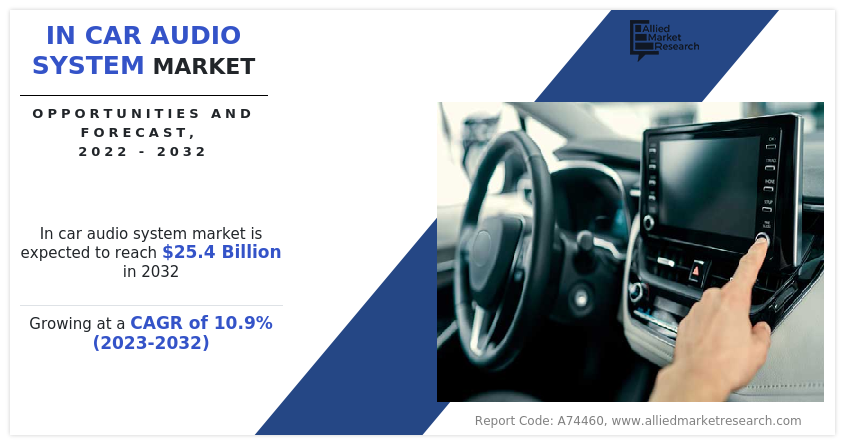
The in car audio system market is segmented into Component, Manufacturer, Vehicle Type and Sales Channel.
The growth of the global in-car audio system market is majorly driven by surge in demand for installation of high-end audio systems. In addition, the increase in trend of music streaming & audio entertainment as well as rise in demand for in-car infotainment systems notably contribute toward the growth of the market. In-car infotainment systems are gaining high traction among consumers, as they provide a range of features such as GPS navigation, internet connectivity, and audio entertainment, thus boosting their demand globally. Moreover, the increase in penetration of connected cars is augmenting the growth of the market, as these cars are equipped with advanced audio systems that enhance the driving experience.
Integration of Internet of Things (IoT) and advanced driver assistance systems (ADAS) in in-car audio system, increase in demand for advanced sound systems in high-end cars, and upsurge in sale of passenger cars act as the key drivers of the global in-car audio system market. However, inflated cost of in-car audio systems and cut-throat competition among key players coupled with availability of alternative audio sources restrain the growth of in-car audio system the market. On the contrary, the surge in demand for connected cars and the geographical expansions & technological advancements are expected to create lucrative opportunities for leading players in-car audio system operating in the market.
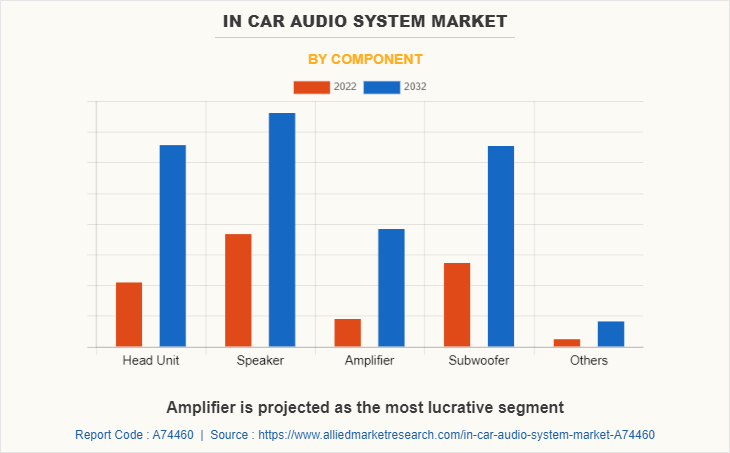
Factors such as adoption of IOT and ADAS in in-car audio system, increasing demand for high quality sound systems in luxury cars, and rise in sale of passenger cars are the major drivers for in car audio system market. Moreover, factors such as high cost of in-car audio system, and cut-throat competition among key players coupled with availability of alternative audio sources restrain the growth of market. Furthermore, factors such as Surge in demand for connected cars, and geographical expansions & technological advancements are expected to create lucrative opportunities for leading players of market.
The in car audio system market is segmented on the basis of component, manufacturer, vehicle type, sales channel, and region. On the basis of component, it is divided into head unit, speaker, amplifier, subwoofer, and others. On the basis of manufacturer, it is classified into branded, and non-branded. On the basis of vehicle type, it is classified into ICE, and EV. On the basis of sales channel, it is classified into OEM, and aftermarket. On the basis of region, the market is analyzed across North America, Europe, Asia-Pacific, and LAMEA.
Growth drivers, restraints, and opportunities are explained in the study to better understand the market dynamics. This study further highlights key areas of investment. In addition, it includes Porter’s five forces analysis to understand the competitive scenario of the industry and the role of each stakeholder. The study features strategies adopted by key market players to maintain their foothold in the market. The leading players operating in the in car audio system market are Alpine Electronics, Inc., Bang & Olufsen, Blaupunkt GmbH, Clarion Co., Ltd., HARMAN International, JLAudio, JVC Kenwood Holdings Inc., Panasonic Industry Co., Ltd., Pioneer Corporation, and Sony Group Corporation.
Adoption of IOT and ADAS in in-car audio system
The integration of Internet of Things (IoT) in in-car systems has led to the development of intelligent and connected vehicles, offering a range of advanced features and services to drivers and passengers. An IoT-enabled audio system in a car can provide a host of benefits to the driver and passengers. The most prominent benefit is the ability to connect to various audio streaming services such as Spotify, Apple Music, and Tidal. By connecting the car audio system to the internet, users can access an unlimited library of music, podcasts, and audiobooks.
Furthermore, the advanced driver assistance system (ADAS) is a set of technologies designed to enhance the safety and comfort of driving. ADAS systems use sensors and cameras to monitor the vehicle's surroundings and provide real-time feedback to the driver, assisting with tasks such as parking, lane changes, and collision avoidance. One of the primary drivers of the IoT in-car audio system is the increasing demand for connected cars. Connected cars integrated with IoT enables them to communicate with other vehicles, infrastructure, and devices. In addition, these cars offer a range of features such as real-time traffic updates, remote vehicle control, and automatic emergency response. With the increase in demand for these features, car manufacturers have focused on integrating IoT technologies in their vehicles, thereby propelling the adoption of smart voice assistant, IoT, and ADAS in in-car audio system.
Moreover, ADAS technologies can be used to provide personalized services to drivers and passengers. For instance, ADAS-enabled in-car audio systems can be used to provide personalized music and movie recommendations based on the user's preferences, making the driving experience more enjoyable and convenient. In addition, an IoT-enabled audio system can provide real-time traffic updates and other relevant information to the driver. By using sensors and data analytics, the audio system can detect traffic congestion and suggest alternative routes, thus reducing the travel time and improving the overall driving experience.
Furthermore, IoT- and ADAS-enabled audio systems are becoming increasingly popular in modern cars, providing numerous benefits such as access to a vast library of music & personalized recommendations and interaction with other devices in the car. Hence, IoT and ADAS are likely to set a positive trend for the in car audio system market during the forecast period.
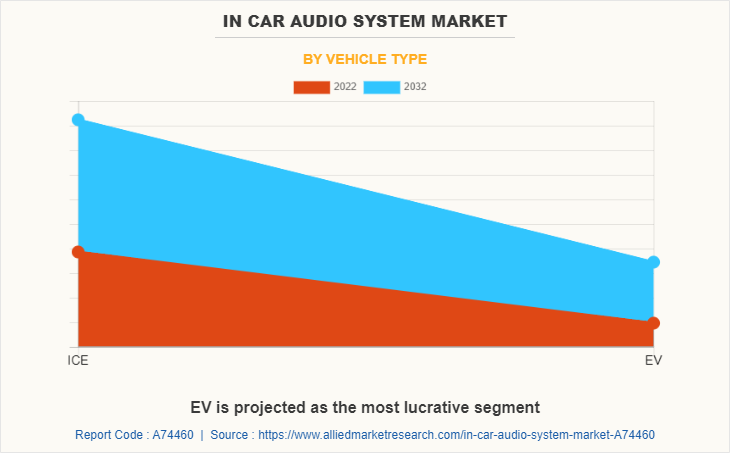
Increasing demand for high quality sound systems in luxury cars
Luxury cars are known for their high-end features, and one of the most sought-after features is a premium sound system. In recent years, the demand for high-quality sound systems in luxury cars has increased significantly. Drivers and passengers are looking for an immersive and enjoyable audio experience while traveling, and luxury car manufacturers are meeting this demand by providing advanced sound systems that can deliver superior sound quality.
The demand for high-quality sound systems in luxury cars can be attributed to factors such as technological advancements that have made it possible to integrate advanced sound systems into cars, thus providing a better audio experience than ever before. These sound systems use cutting-edge technologies such as digital signal processing (DSP), surround sound, and multi-channel amplifiers to deliver clear and immersive sound.
Furthermore, rise in penetration of streaming services has changed the way people listen to music. Music streaming services such as Spotify and Apple Music have become popular among drivers and passengers, providing access to a vast library of songs on the go. As a result, the demand for sound systems that can deliver high-quality audio has been witnessed to grow significantly.
Moreover, luxury car manufacturers have recognized the importance of sound systems in their vehicles and are investing heavily in R&D to provide the best sound systems for their customers. They are working with leading audio brands to develop sound systems that are tailored to the unique acoustics of their vehicles, thus providing a superior sound quality that is unmatched by other cars. For instance, in 2019, Bang & Olufsen developed a custom sound system for the Audi A8 that uses 3D sound technology to deliver an immersive audio experience. The system includes 23 speakers, a 1,920-watt amplifier, and a subwoofer that is integrated into the car's frame to provide a deeper and more powerful bass.
Similarly, Burmester company developed a custom sound system for the Mercedes-Benz S-Class that uses a 3D surround sound system to deliver an immersive audio experience. The system includes 24 speakers, a 24-channel amplifier, and a 3D sound processor that provides a clear and detailed audio experience.
In addition, luxury car manufacturers are focusing on improving the design of their sound systems by providing a seamless and integrated look that complements the car's overall aesthetic. This ensures that the sound system not only delivers superior sound quality but also enhances the overall look and feel of the car.
Moreover, luxury car manufacturers are using advanced technologies such as noise cancellation to reduce unwanted external noise and provide a more immersive audio experience. This technology uses microphones to detect external noise and cancels it, providing a quieter and more enjoyable ride. Thus, with continued demand for high-quality audio experiences, the market for in-car audio systems is expected to continue its upward trajectory during the forecast period.
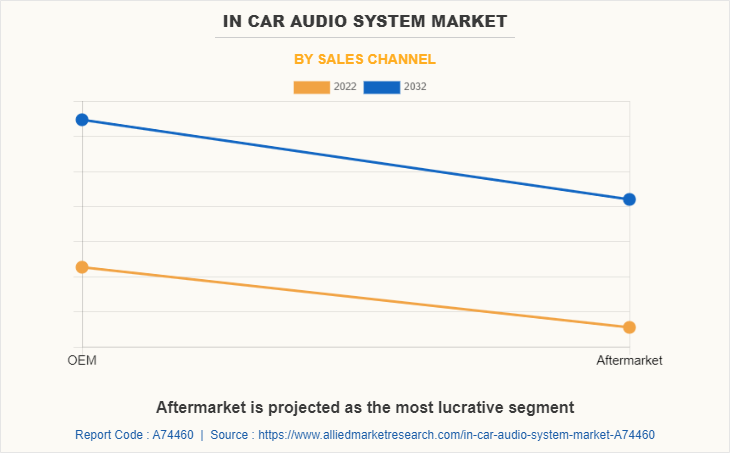
Cut-throat competition among key players coupled with availability of alternative audio sources
The market for in-car audio systems is highly competitive, with many manufacturers vying to gain a major share, with each company striving to offer the most innovative and high-quality audio systems. This competition can drive manufacturers to continually improve their products, offering new and advanced features to gain a competitive edge. However, it can lead to a crowded and confusing market, with consumers facing a bewildering array of options.
One of the ways that manufacturers compete with each other is by offering unique features and technologies. For example, some manufacturers may focus on offering high-end speakers and amplifiers, whereas others may prioritize advanced connectivity options such as Bluetooth and Wi-Fi. Furthermore, some manufacturers may offer more modular or customizable systems, allowing consumers to upgrade or modify their audio systems over time. Another strategy that manufacturers use to stay ahead of the competition is by building strong brand recognition and customer loyalty. This can be achieved through targeted marketing campaigns, offering excellent customer service and support as well as building a reputation for delivering high-quality products. In addition, many manufacturers offer extended warranties and maintenance plans to build customer loyalty and trust.
However, while competition from other in-car audio system manufacturers can be intense, it is important to note that these companies are not the only competitors in the market. Other audio sources such as streaming services, podcasts, and satellite radio can pose a threat to the in-car audio system market. These alternative sources of audio entertainment can provide a more flexible and cost-effective solution for many consumers, especially those who do not prioritize high-end audio quality.
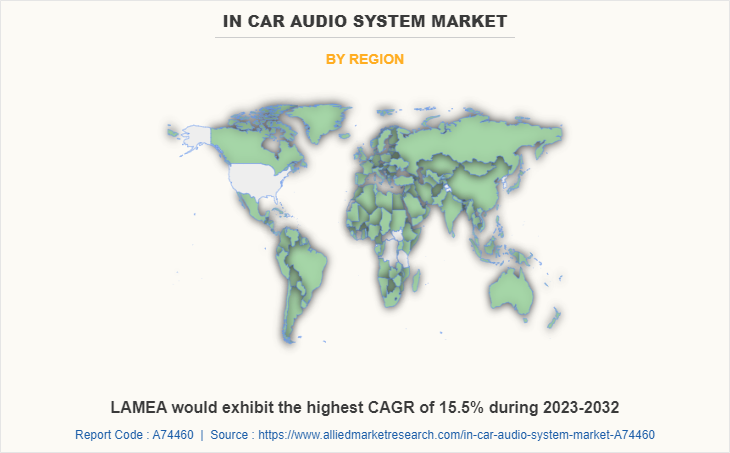
Geographical expansions and technological advancements
Expanding into emerging markets is expected to offer a lucrative opportunity for in-car audio system manufacturers. Emerging markets such as Asia-Pacific, Africa, and Latin America are experiencing rapid economic growth and a growing middle class. This growth is resulting in an increased demand for cars and car-related products, including in-car audio systems.
Asia-Pacific, in particular, serves as a potential market for in-car audio systems. The region is home to several rapidly developing countries, including China and India, where a growing middle class is driving demand for cars. In addition, connected cars are rapidly gaining popularity as consumers demand more advanced connectivity options. Manufacturers who offer advanced connectivity options, such as Bluetooth and Wi-Fi, are likely to see significant growth in emerging markets.
Moreover, the demand for advanced in-car audio systems is increasing as consumers continue to seek the latest features for their vehicles. With the rise in demand for connected cars and increase in importance of entertainment systems in vehicles, manufacturers are under pressure to innovate and offer new features that improve the overall driving experience.
Bluetooth connectivity has been a standard feature in most vehicles, but consumers are looking for more advanced connectivity options, such as Apple CarPlay and Android Auto. These features allow drivers to seamlessly integrate their smartphones with their vehicles, making it easier to make calls, send messages, and access their favorite music & entertainment apps. Thus, all these factors collectively are anticipated to open new avenues for the expansion of the global in-car audio system market during the forecast period.
Key Benefits For Stakeholders
- This report provides a quantitative analysis of the market segments, current trends, estimations, and dynamics of the in car audio system market analysis from 2022 to 2032 to identify the prevailing in car audio system market opportunities.
- The market research is offered along with information related to key drivers, restraints, and opportunities.
- Porter's five forces analysis highlights the potency of buyers and suppliers to enable stakeholders make profit-oriented business decisions and strengthen their supplier-buyer network.
- In-depth analysis of the in car audio system market segmentation assists to determine the prevailing market opportunities.
- Major countries in each region are mapped according to their revenue contribution to the global market.
- Market player positioning facilitates benchmarking and provides a clear understanding of the present position of the market players.
- The report includes the analysis of the regional as well as global in car audio system market trends, key players, market segments, application areas, and market growth strategies.
In Car Audio System Market Report Highlights
| Aspects | Details |
| Market Size By 2032 | USD 25.4 billion |
| Growth Rate | CAGR of 10.9% |
| Forecast period | 2022 - 2032 |
| Report Pages | 289 |
| By Component |
|
| By Manufacturer |
|
| By Vehicle Type |
|
| By Sales Channel |
|
| By Region |
|
| Key Market Players | Bang & Olufsen, HARMAN International, ALPS ALPINE CO., LTD., FORVIA Faurecia, JVCKENWOOD Corporation, Sony group corporation, JLAudio, Panasonic Industry Co., Ltd., Pioneer Corporation, Blaupunkt |
Analyst Review
The top-level executives are seeing a growing trend of wireless audio systems in car audio systems. According to Chris Cook, the president of JL Audio, a leading manufacturer of in-car audio systems, "The trend is moving towards wireless audio systems that allow consumers to connect their smartphones and other devices to their car audio systems without the need for cables or wires." This trend is being driven by the increase in demand for convenience and ease of use as well as a rise in the use of connected cars.
The installation of smart speakers has witnessed an increase in cars, as they provide a range of features, from voice control to personalization and connectivity. These features are making it easier and more convenient for consumers to control their in-car audio systems along with improving the overall driving experience. As consumers become more environmentally conscious, they are seeking eco-friendly and sustainable products, including cars and car audio systems. This trend is being driven by the need to reduce carbon emissions and promote sustainable transportation.
The demand for audio in cars is not limited to high-end luxury vehicles. Budget cars are now being equipped with advanced audio systems that offer high-quality sound output. This is attributed to the fact that consumers are becoming increasingly aware of the importance of audio quality, and they are willing to pay extra for a car that offers superior audio experience. In addition to in-car infotainment systems and music streaming services, the demand for audio in cars is driven by the growing popularity of podcasts and audiobooks. Thus, car manufacturers are responding to this trend by integrating these services into their infotainment systems.
The demand for audio in cars is expected to continue to grow in the coming years due to increase in availability of high-quality audio equipment, rise in popularity of music streaming services & podcasts, and surge in demand for in-car infotainment systems. Car manufacturers are responding to this trend by investing heavily in the development of advanced audio systems that offer a superior sound experience.
Surge in demand for connected cars and geographical expansions and technological advancements are the upcoming trends of in car audio system market in the world.
ICE (Internal Combustion Engine) and EV (Electric Vehicle) are the types of vehicles considered in in car audio system market.
Asia-Pacific is the largest regional market for in car audio system.
The industry size of in car audio system market was $9.6 billion in 2022.
ICE (Internal Combustion Engine) segment by vehicle type to hold the highest market share in in car audio system.
Loading Table Of Content...
Loading Research Methodology...



